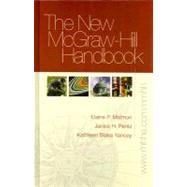Writing and research have changed dramatically since the first hardcover handbooks appeared. Today's students don't just write papers: they create multimedia presentations. They don't just do research: they find their way through a maze of online information. They don't just read print: they analyze visuals. They don't just come to class: they participate in an online learning community.
These changes have put new demands on composition courses. With its focus on writing in college and its integrated coverage of technology and visual rhetoric, The New McGraw-Hill Handbook has been designed to meet those demands.








